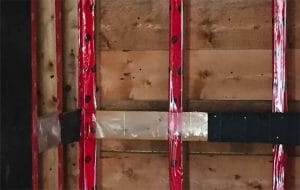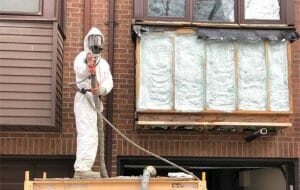Is Your Home Energy-Efficient? Upgrade with Foam Insulation
Energy efficiency is a top priority for homeowners. Not only does it help reduce your environmental footprint, but it also leads to significant cost savings on energy bills. If you’re looking to make your home more energy-efficient, upgrading to foam insulation is one of the best investments you can make. Expanding foam insulation offers numerous benefits that can improve your home’s comfort, efficiency, and overall performance.
Superior Insulation Properties
Foam insulation is known for its exceptional insulating properties. Expanding foam insulation creates a seamless, airtight barrier that prevents heat transfer, unlike traditional insulation materials such as fibreglass or cellulose. It forms a continuous insulation layer, eliminating gaps and reducing air leakage, ensuring maximum energy efficiency.
Enhanced Thermal Performance
The high R-value (thermal resistance) of foam insulation helps regulate indoor temperatures throughout the year. By preventing heat loss in winter and heat gain in summer, foam insulation ensures a more consistent and comfortable living environment. It minimizes hot or cold spots in your home, allowing for better temperature control and reducing the need for excessive heating or cooling.
One of the key advantages of foam insulation is its ability to provide superior air sealing. Foam insulation expands and fills every nook and cranny, creating a tight seal that blocks air infiltration. This air-sealing feature prevents drafts, reduces energy loss, and helps maintain stable indoor temperatures. It also minimizes the entry of outdoor pollutants, allergens, and moisture, improving indoor air quality and creating a healthier living space.
Moisture Control
Foam insulation is moisture-resistant, making it an excellent choice for areas prone to high humidity or water intrusions, such as basements or crawlspaces. By effectively sealing out moisture, foam insulation helps prevent mould growth, rot, and structural damage caused by water infiltration. It creates a barrier safeguarding your home against moisture-related issues, promoting a healthier and more durable living environment.
In addition to its insulation properties, foam insulation provides excellent soundproofing benefits. The dense structure of foam insulation helps absorb and reduce noise transmission from outside sources, such as traffic or neighbouring properties. This results in a quieter indoor environment, enhancing comfort and overall livability.
Long-Term Savings
Investing in foam insulation can lead to substantial long-term savings on your energy bills. By reducing energy loss through improved insulation, your heating and cooling systems operate more efficiently, consuming less energy to maintain desired indoor temperatures. This translates into lower monthly energy costs and significant savings over time. Additionally, many utility companies offer incentives and rebates for energy-efficient upgrades, making foam insulation an even more attractive investment.
Environmental Benefits
Choosing foam insulation for your home benefits your wallet and the environment. By reducing energy consumption and greenhouse gas emissions, foam insulation helps mitigate climate change and contributes to a more sustainable future. It’s a responsible choice that aligns with Canada’s commitment to reducing carbon emissions and building greener, more energy-efficient homes.
Upgrading your home with foam insulation is smart for improving energy efficiency, comfort, and cost savings. Its superior insulation properties, thermal performance, air sealing benefits, moisture control, noise reduction, and long-term savings make it an ideal choice for homeowners seeking to reduce their environmental impact and enhance their living spaces.
Consider consulting with a professional insulation contractor to assess your home’s insulation needs and explore the options to upgrade to foam insulation. With this energy-efficient upgrade, you can enjoy a more comfortable, eco-friendly, and energy-efficient home.

Warning: count(): Parameter must be an array or an object that implements Countable in /home/spraycitycom/public_html/wp-content/themes/sci_theme/single-post.php on line 45
Notice: Trying to access array offset on value of type bool in /home/spraycitycom/public_html/wp-content/themes/sci_theme/single-post.php on line 47
Notice: Trying to access array offset on value of type null in /home/spraycitycom/public_html/wp-content/themes/sci_theme/single-post.php on line 49
Warning: count(): Parameter must be an array or an object that implements Countable in /home/spraycitycom/public_html/wp-content/themes/sci_theme/single-post.php on line 45
Notice: Trying to access array offset on value of type null in /home/spraycitycom/public_html/wp-content/themes/sci_theme/template-parts/section-technicians.php on line 9
Notice: Trying to access array offset on value of type null in /home/spraycitycom/public_html/wp-content/themes/sci_theme/template-parts/section-technicians.php on line 10
Warning: count(): Parameter must be an array or an object that implements Countable in /home/spraycitycom/public_html/wp-content/themes/sci_theme/single-post.php on line 69
Notice: Trying to access array offset on value of type bool in /home/spraycitycom/public_html/wp-content/themes/sci_theme/single-post.php on line 71
Notice: Trying to access array offset on value of type null in /home/spraycitycom/public_html/wp-content/themes/sci_theme/single-post.php on line 75
Warning: count(): Parameter must be an array or an object that implements Countable in /home/spraycitycom/public_html/wp-content/themes/sci_theme/single-post.php on line 75
Notice: Trying to access array offset on value of type null in /home/spraycitycom/public_html/wp-content/themes/sci_theme/single-post.php on line 84
Warning: count(): Parameter must be an array or an object that implements Countable in /home/spraycitycom/public_html/wp-content/themes/sci_theme/single-post.php on line 84
Notice: Trying to access array offset on value of type null in /home/spraycitycom/public_html/wp-content/themes/sci_theme/single-post.php on line 99
Warning: count(): Parameter must be an array or an object that implements Countable in /home/spraycitycom/public_html/wp-content/themes/sci_theme/single-post.php on line 99
Warning: count(): Parameter must be an array or an object that implements Countable in /home/spraycitycom/public_html/wp-content/themes/sci_theme/single-post.php on line 69

